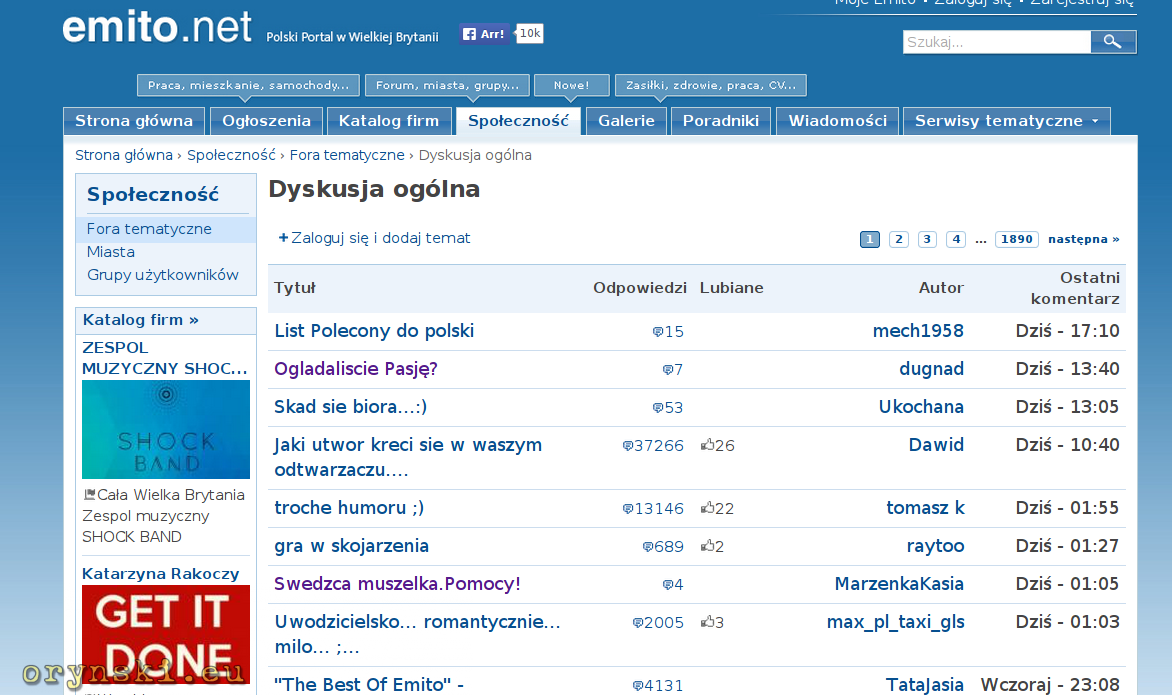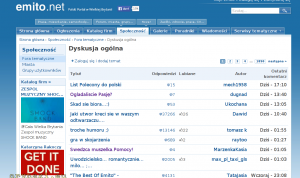Translated by Craig Proctor
Were the thousands who marched down the streets calling us to arms against ACTA the only ones concerned with internet freedom? The government’s designs on the internet users freedom were fought off, and their lives returned to normal, in other words Facebook, Google and other sites resembling Wykop and Reddit. Having repelled the evil wolf, the protesters jauntily made their way marching right into the dragon’s jaws.
 Long, long ago in the stone age of Linux the internet were extremely fragmented. A blinking rose-coloured light frightened us from round every virtual corner from pages like “Julia’s home page”or “Christina’s nooks and crannies”. Companies often organised themselves into, so called, webrings and linked together with their partners. The search engine’s main job seemed to be spitting out millions upon millions of pornographic pages, so still valued were internet catalogues and hot-headed bloggers linking trustworthiness with information. People still communicated with each other through IRC, emails, and various communiqué from ICQ to Gadu-Gadu and doggedly discussed on sites and discussion forums.
Long, long ago in the stone age of Linux the internet were extremely fragmented. A blinking rose-coloured light frightened us from round every virtual corner from pages like “Julia’s home page”or “Christina’s nooks and crannies”. Companies often organised themselves into, so called, webrings and linked together with their partners. The search engine’s main job seemed to be spitting out millions upon millions of pornographic pages, so still valued were internet catalogues and hot-headed bloggers linking trustworthiness with information. People still communicated with each other through IRC, emails, and various communiqué from ICQ to Gadu-Gadu and doggedly discussed on sites and discussion forums.
Take a look around the internet now: IRC only clings on to a few surviving members and lovers of all things vintage. Communiqué, even Skype, are giving way to services like Facebook chat or Google hangout. Practically, the entire on-line world is transferring to Facebook. That’s where the passionate discussions are going on. That’s were threads about parties disseminate. Even the foolish chain letters, that had been haunting our email boxes until very recently, have resettled.
But other aspects of internet life are also transferring to Facebook. Not many newly emerging companies will bother setting up an internet site. Why should they, when no one is going to see it anyway? It’s enough to open a page on Facebook. Teachers are now using Facebook as a platform to converse with their pupils. Student and academic circles also use Facebook as their main means of communication. Without ever logging out of Facebook you can be up to date with what’s going on in the world almost in real time, because thanks to clicking the like button, now placed practically everywhere on the internet, Facebook can feed us with information and tell us in real time what our friends are reading. If someone doesn’t have Facebook they are practically cut off form our main source of info. As if to prove that, a few of my friends who, after deleting their account, came back some time later with their tails between their legs. To put it simply, if you’re not on Facebook, you are out of the social circle.
And this is where the problem arises: internet site administrators place a plug for Facebook on their sites, in doing so they assure their own connection to the main trend on the net, but simultaneously they give up part of their sovereignty to Mark Zuckenberg. For example, thanks to our Facebook plug we have took care of the quality of discussion on our site as articles can only be commented on from a Facebook account. This has helped us avoid a plague of anonymous trolling. However, if Mark Zuckenberg ever decides to disable this service no one will be able to comment on our articles until we re-establish native comment system of our page.
The layout of the American military internet precursors was designed to be indestructible. The entire system was designed so that there wouldn’t be a nucleus, therefore seizing the main headquarters or even nuclear bombardment of the country wouldn’t make it possible to take full control of the net (or what remained of it). Today a few big internet players, Facebook and Google, are doing everything in their power to bring all internet traffic into their hands. Perhaps you realised that when you paste a link for someone on Facebook and then copy it again and paste it somewhere else it doesn’t look the same. At least that’s the way it was until recently. Similarly, when you click on a link you’ve been sent you do not go instantly there, but are, at first, rerouted through Facebook. In the same way, some time ago there was a situation where when you had typed the correct address you would land on Facebook’s page instead of the page you had wanted. By a strange twist of fate this only affected pages that had a Facebook plug on them. As can be seen, the conglomerate is still perfecting its methods of gathering information on who, where, what and how many.
By now it probably isn’t a surprise for anyone that Facebook is analysing how we use its services in every which way possible. Now that its spread its tentacles over other sites it wants to observe what we are doing when we are surfing on the wider waters of the world wide web. It’s not as big deal if it just analysing that information, because if we abide by the Internet’s founding rule we won’t place any information out there that we wouldn’t want to come to light later. In which case we have nothing to fear. The bigger problem is that more and more internet traffic is flowing through channels controlled by Facebook. Since staying outside Facebook circles, has to some extent, already became a form of social exclusion, what would happen if Zukenberg was to decide and pull the plug from the socket? I have no phone number or email for many friends, whom I regularly contact through Facebook. Many young people, such as my friends daughter, don’t have any email other than that unified with their Facebook account. The result is that all the internet traffic is starting to thicken around a few points like Facebook and Google. This is dangerous even if none of these firms has any bad intentions. Something happens, their servers take a tumble, and we are lost. Do you remember the panic when Wikipedia disappeared from the internet for just one day? Now imagine the one and only channel that is essential to many for their work and communications disappears…
But there is yet another threat. Perhaps you noticed not long ago the option appeared to promote your posts on Facebook. For a modest payment Facebook guarantees that more people will see your entry. This is a real and actual threat to internet freedom. Most of the information that arrives in my email box has to first pass through the configuration I selected on my email settings (there are many to choose from), or through a subscription to a discussion forum. It also must pass through a list of addresses already marked out as spam. This means that I can set the boundaries for what really interests me. Up to a point, Facebook also regulates what reaches my wall, but the problem is that Facebook always has the final say in what goes through and what doesn’t, and not me. There is no way of bypassing this process, because everything is decided on Facebook’s side of the web and not ours. When it comes to other hardware, we had the option to use alternative providers. For example, for years when I was using Gadu-Gadu, most popular Polish communicator, I used Open Source client Kadu. Thanks to which I wasn’t constantly under attack from clamorous advertisements, and I could use instant messenger on an officially unsupported platform, Linux. Facebook can even be used by obsolete mobiles, which makes its use popular in third world countries, but this is only possible because everything is controlled from Facebook’s side.
The question of how open the coding is is a different matter. In the case of Open Source, everyone had access to the program code, even if they didn’t know much about it they could assume that if something wasn’t right, one of the thousands of IT specialists combing through would notice and blow the whistle. With Google, Facebook and some other companies the code is secret and patented. We know of cases when Google has intentionally deleted results from search engines to conceal content inconvenient for certain totalitarian regimes in return for being allowed to conduct their business there. What guarantees do we have that something similar isn’t going on on Facebook? What guarantees do we have that Wykop (a Polish digg.com clone) isn’t only promoting companies that have paid for Wykop sponsoring, but is also deleting links leading to other portals that weren’t interested in paying for their advertisements?
Recently during an interview for Natemat.pl Tomasz Raczek, a well known Polish film critic, said he publishes some of his opinions on Facebook because he fells he has complete freedom there. Just after reading that articles I has talking with a friend, who is a specialist in Japanese studies, about the strange sexual game shows and the distinct relationship the Japanese have with pornography and erotica. In a private conversation Facebook didn’t allow a link to be sent from one of these game shows because it regarded the clip as being pornographic. You call that complete freedom, when, in a private conversation with a friend, Facebook decides what can and can’t be sent? Hanka received the link that had been banned by Facebook through Gadu-Gadu, but I don’t doubt for a moment that somewhere in the server’s abyss in California it has been recorded that I tried to disperse pornography.
Well, that’s the way it looks today. From my list of around 240 friends on Gadu-Gadu maybe five still use is to keep in touch. As we transfer more and more of our means of communication to Facebook other channels are becoming extinct. In other words, we are placing the internet, probably today’s strongest medium, into the hands of just a few companies. The situation is in deadlock: It’s difficult to get by without Facebook, but perhaps it will all end even worse with it. Quo vadis, Internet?
Text was published in gazetae.com





